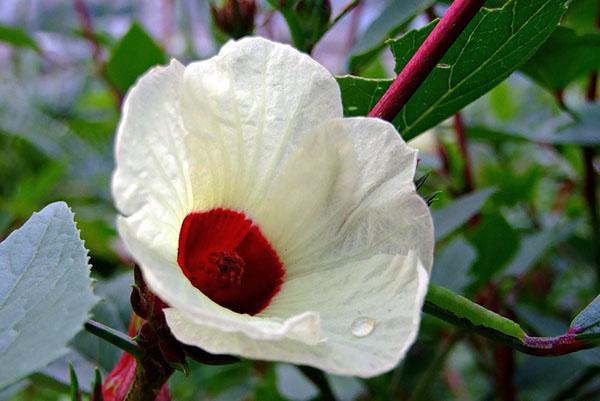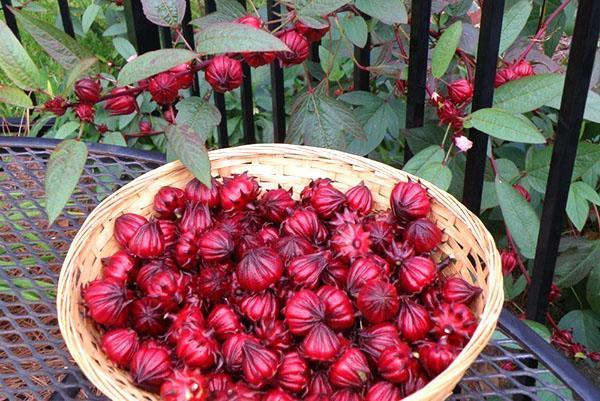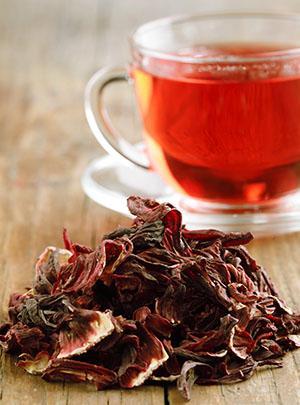What do you know about the health benefits of hibiscus tea?
 The genus of hibiscus has more than fifty species, some of which are popular decorative and industrial crops. But only one hibiscus, tea, and the beneficial properties of this red drink with a slightly sour taste, received worldwide fame.
The genus of hibiscus has more than fifty species, some of which are popular decorative and industrial crops. But only one hibiscus, tea, and the beneficial properties of this red drink with a slightly sour taste, received worldwide fame.
This type of hibiscus is called Rosella or Hibiscus sabdariffa, which can be found in the wild in India. By the will of fate, in antiquity, the culture was exported to the Middle East and northern Africa. Here, from the carmine flower cups and the resulting hibiscus ovaries, they began to make an infusion with a beautiful red-raspberry color, a pleasant refreshing taste and a lot of useful qualities.
Today hibiscus or hibiscus tea is industrially produced not only in India, Egypt, Sudan, where the drink has long become traditional. Rosella plantations are cultivated in Java, in Southeast Asia and even in South America.
Hibiscus tea composition

 Anthocyanins give this color to the drink. These are biologically active compounds used as food additives and have a positive effect on the human body. According to the latest research, these substances:
Anthocyanins give this color to the drink. These are biologically active compounds used as food additives and have a positive effect on the human body. According to the latest research, these substances:
- help to strengthen the walls of blood vessels;
- counteract the accumulation and deposition of cholesterol;
- find application in the prophylaxis and prevention of atherosclerosis, ischemic disease, heart attacks and strokes.
The beneficial properties of hibiscus include a high content of antioxidants, vitamins, organic acids, which contribute to maintaining tone and well-being.
Not only hot or cold infusion is useful, but also what remains after brewing. In the parts of the flower softened with hot water, a significant amount of amino acids, vegetable protein, pectins remains.
Useful properties of hibiscus and its infusion
Red, almost ruby hibiscus tea has antispasmodic, laxative, diuretic properties. Even in ancient times, fresh infusion was used to relieve fever, and crushed flowers were applied to suppurating, poorly healing wounds and bleeding.
 Today, the composition and capabilities of hibiscus are better studied, and we can talk about the presence of the Sudanese rose, as hibiscus is called, not only antipyretic and bactericidal properties, but also ability;
Today, the composition and capabilities of hibiscus are better studied, and we can talk about the presence of the Sudanese rose, as hibiscus is called, not only antipyretic and bactericidal properties, but also ability;
- resist seizures;
- relieve swelling;
- to improve the work of the digestive tract and intestines;
- cleanse the body of toxins, accumulation of gases, heavy metals and toxins;
- improve the functioning of the liver and gallbladder.
The beneficial properties of hibiscus tea are in demand when there is a threat of weakening the body after serious diseases, intense work associated with stress. In this case, a beautiful infusion:
- effectively relieves chronic fatigue syndrome;
- improves brain performance;
- increases tone;
- activates the body's defenses.
The decoction in cold and hot form can be useful as part of the prevention of cancer, as well as in inflammatory processes in the genitourinary sphere, helminthic invasions and other serious diseases.
 Due to the ability to cleanse the body and the presence of valuable organic acids, vitamins, red tea from the flowers of the Sudanese rose helps to recover and get rid of toxins after drinking alcoholic beverages or in case of food poisoning.
Due to the ability to cleanse the body and the presence of valuable organic acids, vitamins, red tea from the flowers of the Sudanese rose helps to recover and get rid of toxins after drinking alcoholic beverages or in case of food poisoning.
If the expectant mother does not have signs of an allergic reaction, then this remedy is effective for manifestations of pregnancy toxicosis.
Contraindications for taking hibiscus tea
 Since tea contains quite a lot of acids that determine its pleasant, refreshing taste, under certain circumstances, not only the benefits of hibiscus, but also harm are possible. An artificial increase in the acid content in gastric juice can lead to a deterioration in well-being in case of peptic ulcer disease or gastritis with high acidity.
Since tea contains quite a lot of acids that determine its pleasant, refreshing taste, under certain circumstances, not only the benefits of hibiscus, but also harm are possible. An artificial increase in the acid content in gastric juice can lead to a deterioration in well-being in case of peptic ulcer disease or gastritis with high acidity.
There is a risk of developing allergic reactions, especially if a person has a predisposition to this or has an increased sensitivity to plants or food. Due to possible negative effects on the skin and digestive reactions, hibiscus tea should not be given to children under 1-3 years old.